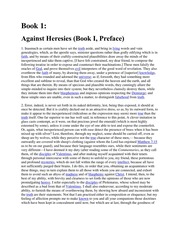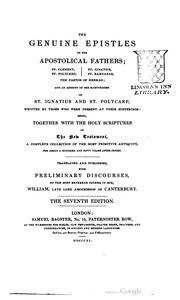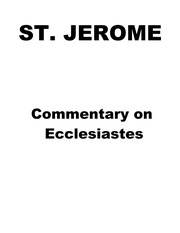The doctrine of predestination, as other Christian doctrine, existed in earlier centuries, but was refined and put into systematized creeds and confessions in the Protestant Reformation, but it clearly existed as belief in the early church as I give a few quotes. To claim it was invented by Calvin is a red herring claimed by the deceitful, and passed on by the ignorant. I give the links so the reader can check the source for themselves.
First Epistle of Clement has been dated 70-140 AD
"5. Who shall say to him what hast thou done, or who shall resist the might of his strength?” When he will, and as he will, he will do all things, and none of his decrees shall pass away."

"1. Let us then approach him in holiness of soul, The raising pure and undefiled hands to him, loving our gracious and merciful Father, who has made us the portion of his choice for himself."

Irenaeus, (130-202 AD)
"But He Himself in Himself, after a fashion which we can neither describe nor conceive, predestinating all things, formed them as He pleased, bestowing harmony on all things, and assigning them their own place, and the beginning of their creation."

"And therefore, when the number [fixed upon] is completed, [that number] which He had predetermined in His own counsel, all those who have been enrolled for life [eternal] shall rise again, having their own bodies, and having also their own souls , and their own spirits,"

"God thus determining all things beforehand for the bringing of man to perfection, for his edification, and for the revelation of His dispensations, that goodness may both be made apparent, and righteousness perfected, and that the Church may be fashioned after the image of His Son, and that man may finally be brought to maturity at some future time, becoming ripe through such privileges to see and comprehend God."

Ignatius of Antioch (died 110 AD)
"Ignatius, who is also called Theophorus, to the church which is at Ephesus in Asia, most deservedly happy, being blessed through the greatness and fulness of God the Father, and predestinated before the world began, that it should be always unto an enduring and unchangeable glory, being united and chosen through' his true passion, according to the will of the Father and Jesus Christ our God ; all happiness by Jesus Christ, and his undefiled grace."

St. John Chrysostom (347-407 AD)
"In order then that the greatness of the benefits bestowed may not raise you too high, observe how he brings you down: by grace you have been saved, says he, Through faith; Then, that, on the other hand, our free-will be not impaired, he adds also our part in the work, and yet again cancels it, and adds, And that not of ourselves. Neither is faith, he means, of ourselves. Because had He not come, had He not called us, how had we been able to believe? For how, says he, shall they believe, unless they hear? Romans 10:14 So that the work of faith itself is not our own. It is the gift, said he, of God, it is not of works. Was faith then, you will say, enough to save us? No; but God, says he, has required this, lest He should save us, barren and without work at all. His expression is, that faith saves, but it is because God so wills, that faith saves. Since, how, tell me, does faith save, without works? This itself is the gift of God."
 www.newadvent.org
www.newadvent.org
Jerome (347-419/420 AD)
"But it could be said too, that those things, which will be done have already been done, decided out of foreknowledge and the predestination of God." Commentary on Eccl. 1:10

St. Augustine (354-430 AD) "On Predestination of the Saints"... refuting the heresy of the Pelagians
READ THIS VERY CAREFULLY I've underlined a part of the heretical Pelagian teaching.
"But these brethren of ours, about whom and on whose behalf we are now discoursing, say, perhaps, that the Pelagians are refuted by this apostolic testimony in which it is said that we are chosen in Christ and predestinated before the foundation of the world, in order that we should be holy and immaculate in His sight in love. For they think that having received God's commands we are of ourselves by the choice of our free will made holy and immaculate in His sight in love; and since God foresaw that this would be the case, they say, He therefore chose and predestinated us in Christ before the foundation of the world. Although the apostle says that it was not because He foreknew that we should be such, but in order that we might be such by the same election of His grace, by which He showed us favour in His beloved Son. When, therefore, He predestinated us, He foreknew His own work by which He makes us holy and immaculate. Whence the Pelagian error is rightly refuted by this testimony. But we say, say they, that God did not foreknow anything as ours except that faith by which we begin to believe, and that He chose and predestinated us before the foundation of the world, in order that we might be holy and immaculate by His grace and by His work. But let them also hear in this testimony the words where he says, We have obtained a lot, being predestinated according to His purpose who works all things. Ephesians 1:11 He, therefore, works the beginning of our belief who works all things; because faith itself does not precede that calling of which it is said: For the gifts and calling of God are without repentance; Romans 11:29 and of which it is said: Not of works, but of Him that calls Romans 9:12 (although He might have said, of Him that believes); and the election which the Lord signified when He said: You have not chosen me, but I have chosen you. John 15:16 For He chose us, not because we believed, but that we might believe, lest we should be said first to have chosen Him, and so His word be false (which be it far from us to think possible), You have not chosen me, but I have chosen you. Neither are we called because we believed, but that we may believe; and by that calling which is without repentance it is effected and carried through that we should believe. But all the many things which we have said concerning this matter need not to be repeated."
 www.newadvent.org
www.newadvent.org
The Canons of the Council of Orange, 529 AD
CANON 4. If anyone maintains that God awaits our will to be cleansed from sin, but does not confess that even our will to be cleansed comes to us through the infusion and working of the Holy Spirit, he resists the Holy Spirit himself who says through Solomon, "The will is prepared by the Lord" (Prov. 8:35, LXX), and the salutary word of the Apostle, "For God is at work in you, both to will and to work for his good pleasure" (Phil. 2:13).
CANON 5. If anyone says that not only the increase of faith but also its beginning and the very desire for faith, by which we believe in Him who justifies the ungodly and comes to the regeneration of holy baptism -- if anyone says that this belongs to us by nature and not by a gift of grace, that is, by the inspiration of the Holy Spirit amending our will and turning it from unbelief to faith and from godlessness to godliness, it is proof that he is opposed to the teaching of the Apostles, for blessed Paul says, "And I am sure that he who began a good work in you will bring it to completion at the day of Jesus Christ" (Phil. 1:6). And again, "For by grace you have been saved through faith; and this is not your own doing, it is the gift of God" (Eph. 2:8). For those who state that the faith by which we believe in God is natural make all who are separated from the Church of Christ by definition in some measure believers. *Admittedly, this includes an earlier belief of baptismal regeneration, but the principle remains about the will of the natural man.
CANON 12. Of what sort we are whom God loves. God loves us for what we shall be by his gift, and not by our own deserving.
CANON 23. Concerning the will of God and of man. Men do their own will and not the will of God when they do what displeases him; but when they follow their own will and comply with the will of God, however willingly they do so, yet it is his will by which what they will is both prepared and instructed.
First Epistle of Clement has been dated 70-140 AD
"5. Who shall say to him what hast thou done, or who shall resist the might of his strength?” When he will, and as he will, he will do all things, and none of his decrees shall pass away."
The Apostolic Fathers Volume 1: I. Clement. II. Clement. Ignatius. Polycarp. Didache. Barnabas : Ignatius, Saint, Bishop of Antioch, -approximately 110 : Free Download, Borrow, and Streaming : Internet Archive
The Apostolic Fathers Volume 1: I. Clement. II. Clement. Ignatius. Polycarp. Didache. Barnabas [you are here] The Apostolic Fathers, Volume 2: The Sheperd...
archive.org
"1. Let us then approach him in holiness of soul, The raising pure and undefiled hands to him, loving our gracious and merciful Father, who has made us the portion of his choice for himself."
The Apostolic Fathers Volume 1: I. Clement. II. Clement. Ignatius. Polycarp. Didache. Barnabas : Ignatius, Saint, Bishop of Antioch, -approximately 110 : Free Download, Borrow, and Streaming : Internet Archive
The Apostolic Fathers Volume 1: I. Clement. II. Clement. Ignatius. Polycarp. Didache. Barnabas [you are here] The Apostolic Fathers, Volume 2: The Sheperd...
archive.org
Irenaeus, (130-202 AD)
"But He Himself in Himself, after a fashion which we can neither describe nor conceive, predestinating all things, formed them as He pleased, bestowing harmony on all things, and assigning them their own place, and the beginning of their creation."
Saint Irenaeus Against Heresies Complete : New Advent (Online Content) : Free Download, Borrow, and Streaming : Internet Archive
This is the complete Adversus haereses (Against Heresies) Perhaps the most popular work by Saint Irenaeus. It is the name of a two-volume work against...
archive.org
"And therefore, when the number [fixed upon] is completed, [that number] which He had predetermined in His own counsel, all those who have been enrolled for life [eternal] shall rise again, having their own bodies, and having also their own souls , and their own spirits,"
Saint Irenaeus Against Heresies Complete : New Advent (Online Content) : Free Download, Borrow, and Streaming : Internet Archive
This is the complete Adversus haereses (Against Heresies) Perhaps the most popular work by Saint Irenaeus. It is the name of a two-volume work against...
archive.org
"God thus determining all things beforehand for the bringing of man to perfection, for his edification, and for the revelation of His dispensations, that goodness may both be made apparent, and righteousness perfected, and that the Church may be fashioned after the image of His Son, and that man may finally be brought to maturity at some future time, becoming ripe through such privileges to see and comprehend God."
Saint Irenaeus Against Heresies Complete : New Advent (Online Content) : Free Download, Borrow, and Streaming : Internet Archive
This is the complete Adversus haereses (Against Heresies) Perhaps the most popular work by Saint Irenaeus. It is the name of a two-volume work against...
archive.org
Ignatius of Antioch (died 110 AD)
"Ignatius, who is also called Theophorus, to the church which is at Ephesus in Asia, most deservedly happy, being blessed through the greatness and fulness of God the Father, and predestinated before the world began, that it should be always unto an enduring and unchangeable glory, being united and chosen through' his true passion, according to the will of the Father and Jesus Christ our God ; all happiness by Jesus Christ, and his undefiled grace."
The genuine epistles of the Apostolical Fathers : St. Clement, St. Polycarp, St. Ignatius, St. Barnabas, the Pastor of Hermas : and an account of the martyrdoms of St. Ignatius and St. Polycarp : Wake, William, 1657-1737 : Free Download, Borrow, and
GENERAL CONTENTS. PRELIMINARY DISCOURSE RELATING TO THE SEVERAL TREATISES, AND THE AUTHORS OF THEM. CHAPTER I. PAGE Introduction 1 CHAPTER II. That the...
archive.org
St. John Chrysostom (347-407 AD)
"In order then that the greatness of the benefits bestowed may not raise you too high, observe how he brings you down: by grace you have been saved, says he, Through faith; Then, that, on the other hand, our free-will be not impaired, he adds also our part in the work, and yet again cancels it, and adds, And that not of ourselves. Neither is faith, he means, of ourselves. Because had He not come, had He not called us, how had we been able to believe? For how, says he, shall they believe, unless they hear? Romans 10:14 So that the work of faith itself is not our own. It is the gift, said he, of God, it is not of works. Was faith then, you will say, enough to save us? No; but God, says he, has required this, lest He should save us, barren and without work at all. His expression is, that faith saves, but it is because God so wills, that faith saves. Since, how, tell me, does faith save, without works? This itself is the gift of God."
CHURCH FATHERS: Homily 4 on Ephesians (Chrysostom)
Featuring the Church Fathers, Catholic Encyclopedia, Summa Theologica and more.
Jerome (347-419/420 AD)
"But it could be said too, that those things, which will be done have already been done, decided out of foreknowledge and the predestination of God." Commentary on Eccl. 1:10
Commentary On Ecclesiastes St Jerome : Free Download, Borrow, and Streaming : Internet Archive
1:1 The words of Ecclesiastes, son of David, King in Jerusalem. The Scriptures state very clearly that Solomon was known by three names: ‘Peacemaking’,...
archive.org
St. Augustine (354-430 AD) "On Predestination of the Saints"... refuting the heresy of the Pelagians
READ THIS VERY CAREFULLY I've underlined a part of the heretical Pelagian teaching.
"But these brethren of ours, about whom and on whose behalf we are now discoursing, say, perhaps, that the Pelagians are refuted by this apostolic testimony in which it is said that we are chosen in Christ and predestinated before the foundation of the world, in order that we should be holy and immaculate in His sight in love. For they think that having received God's commands we are of ourselves by the choice of our free will made holy and immaculate in His sight in love; and since God foresaw that this would be the case, they say, He therefore chose and predestinated us in Christ before the foundation of the world. Although the apostle says that it was not because He foreknew that we should be such, but in order that we might be such by the same election of His grace, by which He showed us favour in His beloved Son. When, therefore, He predestinated us, He foreknew His own work by which He makes us holy and immaculate. Whence the Pelagian error is rightly refuted by this testimony. But we say, say they, that God did not foreknow anything as ours except that faith by which we begin to believe, and that He chose and predestinated us before the foundation of the world, in order that we might be holy and immaculate by His grace and by His work. But let them also hear in this testimony the words where he says, We have obtained a lot, being predestinated according to His purpose who works all things. Ephesians 1:11 He, therefore, works the beginning of our belief who works all things; because faith itself does not precede that calling of which it is said: For the gifts and calling of God are without repentance; Romans 11:29 and of which it is said: Not of works, but of Him that calls Romans 9:12 (although He might have said, of Him that believes); and the election which the Lord signified when He said: You have not chosen me, but I have chosen you. John 15:16 For He chose us, not because we believed, but that we might believe, lest we should be said first to have chosen Him, and so His word be false (which be it far from us to think possible), You have not chosen me, but I have chosen you. Neither are we called because we believed, but that we may believe; and by that calling which is without repentance it is effected and carried through that we should believe. But all the many things which we have said concerning this matter need not to be repeated."
CHURCH FATHERS: On the Predestination of the Saints, Book I (Augustine)
Featuring the Church Fathers, Catholic Encyclopedia, Summa Theologica and more.
The Canons of the Council of Orange, 529 AD
CANON 4. If anyone maintains that God awaits our will to be cleansed from sin, but does not confess that even our will to be cleansed comes to us through the infusion and working of the Holy Spirit, he resists the Holy Spirit himself who says through Solomon, "The will is prepared by the Lord" (Prov. 8:35, LXX), and the salutary word of the Apostle, "For God is at work in you, both to will and to work for his good pleasure" (Phil. 2:13).
CANON 5. If anyone says that not only the increase of faith but also its beginning and the very desire for faith, by which we believe in Him who justifies the ungodly and comes to the regeneration of holy baptism -- if anyone says that this belongs to us by nature and not by a gift of grace, that is, by the inspiration of the Holy Spirit amending our will and turning it from unbelief to faith and from godlessness to godliness, it is proof that he is opposed to the teaching of the Apostles, for blessed Paul says, "And I am sure that he who began a good work in you will bring it to completion at the day of Jesus Christ" (Phil. 1:6). And again, "For by grace you have been saved through faith; and this is not your own doing, it is the gift of God" (Eph. 2:8). For those who state that the faith by which we believe in God is natural make all who are separated from the Church of Christ by definition in some measure believers. *Admittedly, this includes an earlier belief of baptismal regeneration, but the principle remains about the will of the natural man.
CANON 12. Of what sort we are whom God loves. God loves us for what we shall be by his gift, and not by our own deserving.
CANON 23. Concerning the will of God and of man. Men do their own will and not the will of God when they do what displeases him; but when they follow their own will and comply with the will of God, however willingly they do so, yet it is his will by which what they will is both prepared and instructed.


